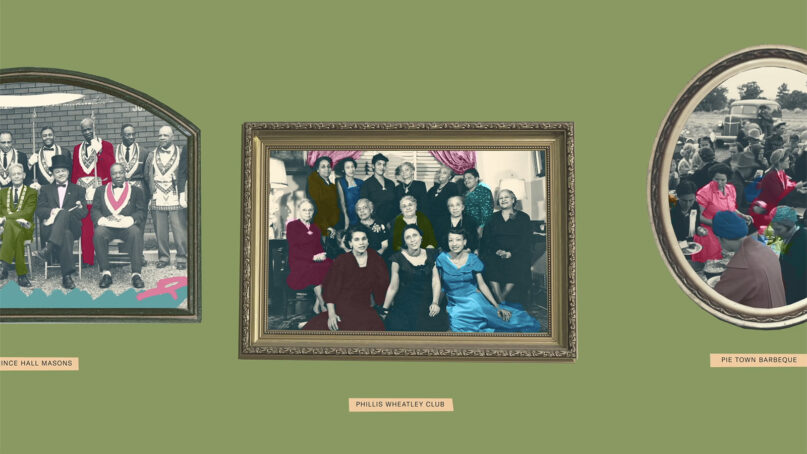(RNS) — The threats to American democracy following the turmoil of the 2020 elections have been much discussed. Documentary filmmakers and siblings Pete and Rebecca Davis have a punchy new solution for it.
In their new film, “Join or Die,” they suggest joining a club — or a religious congregation — may be the key to renewing the nation’s democratic engagement.
The documentary, which premieres at this year’s South by Southwest Film Festival, pays homage to Harvard political scientist Robert Putnam, heralded for his theory that social capital — formed through social engagement in various groups — is the key to building a thriving democracy.
Putnam is of course best known for “Bowling Alone,” the article, then book, published in 2000 that charted the collapse of America’s civic life, symbolized by the rise of solo bowling, as opposed to bowling in leagues.
The book was touted by President Bill Clinton (Hillary Clinton is featured in the documentary), who sought Putnam’s advice about addressing America’s growing social isolation. It became a classic in the field of political science.
RELATED: Robert Putnam thinks religion could play a role in healing divisions
The documentary traces Putnam’s career from his beginnings in the 1970s, when he went to Italy to study how the country’s newly created regional governments were succeeding or failing. He returned to America 20 years later and published a seminal book on the importance of civic community in developing good governance.
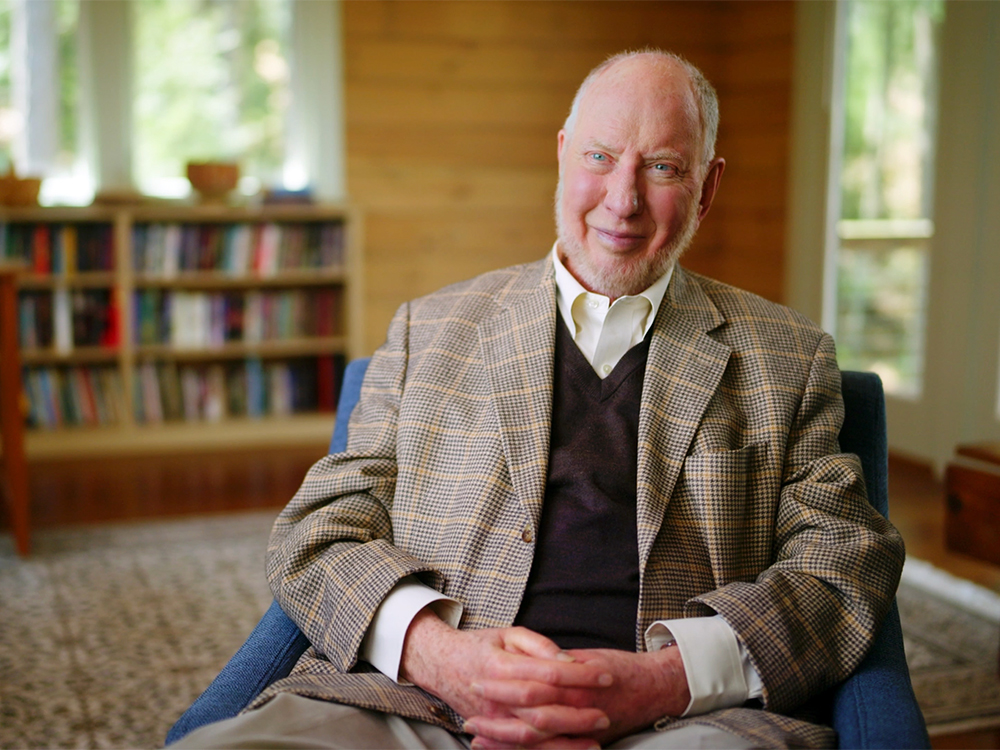
Robert Putnam in the “Join or Die” documentary. Courtesy image
He then turned his attention to the United States after his wife, Rosemary, shared a newspaper article she had read about the decline of memberships in school PTAs. (The film shows that between 1970 and 1990 there was a 40% decline in the number of Americans who attended one public meeting on town or school affairs the previous year.) That declining participation was, for Putnam, a canary in the coal mine, a warning sign about the fraying bonds of trust now so evident across American society.
The film gives glimpses of several thriving civic associations today, including the Independent Order of Odd Fellows in Waxahachie, Texas, and Plainsong Farm in Rockford, Michigan, an Episcopal community led by the Rev. Nurya Love Parish that combines farming and ministry.
Putnam, 82, is now retired, but his student Pete Davis was powerfully influenced by his professor and mentor and joined up with his sister, Rebecca, a video journalist, formerly with NBC News, to create the documentary.
Religion News Service talked to the Davises about Putnam and his ideas, and why America’s democracy may rise or fall on membership in civic associations, including religious congregations. “Join or Die” will be screened March 12-16 at South by Southwest and then at various film festivals across the country. The following interview was edited for length and clarity.
How does a Harvard graduate decide to do a documentary about political science theories?
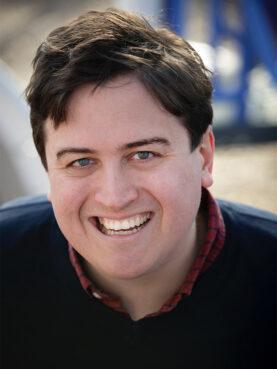
Pete Davis. Courtesy photo
Pete Davis: Of all the classes I took as an undergrad, Bob Putnam’s struck me the most. It gave me a lens to see politics not just as the Constitution or presidential elections or the economy, but also as a social structure of society as a whole. It remained in my head and heart. In the last five years, I kept returning to it. As the Trump era and COVID happened, and people were looking at a path forward, I felt the answers given were not as good as the answers Bob gave us: ordinary citizens joining up and engaging. That is the path that will lead us to heal our democracy.
Rebecca Davis: This is my first independent project. I was a reporter for the New York Daily News and later worked on national news for NBC. I was covering the symptoms on the ground indicating there might be some problems with our democracy and our communities: school shootings, the isolation crisis. But I didn’t feel we were zooming out. I was wanting to do something that was getting more space to think of these larger ideas. I approached my brother and said: How can we turn some of Bob’s ideas into a documentary that can reach a large popular audience?
You show how Putnam hit on his idea after attending a vespers service in a small church in Lake Como, Italy, where it occurred to him that choral societies may contribute to the public good. So it begins with religion.
Pete Davis: A lot of people think of religion theologically. One of the ways Bob thinks of it is sociologically. Religions are not just beliefs. They’re organizations where people meet. They’re places where you build relationships and develop leadership. They’re places where you meet people different from you and do a lot of volunteer work and political work. Religious spaces provide half of all social capital in the U.S. If you want to tell a story about community in America, that’s going to be a big part of it.
Putnam showed the decline in civic participation, including religion. Is it realistic to think people will go back to church?
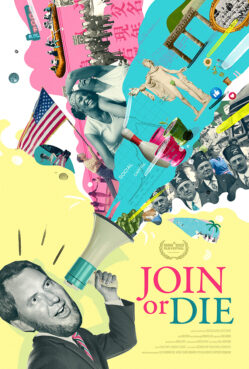
“Join or Die” poster. Courtesy image
Pete Davis: When you live in biographical time, you think it only goes in one direction. But between 1900 and 1960 church attendance went up. Social trust went up. It’s not that we’ve always seen decline. Over time there have been upswings. A constellation of different things happened in that period. A moral shift toward the Social Gospel and a more communitarian morality. An explosion of civic creativity and all these different institutions we know today: the Kiwanis Club and the Rotary Club, and the Boy Scouts. So, he says, we’ve done it before. There’s no reason we can’t do it again. It’s going to look different. You, the viewer, might have to innovate the new type.
Not all joining is a good thing. In the Gilded Era, membership in the Ku Klux Klan was huge. Today, some white Christian nationalist associations are not beneficial to society. Does he address that?
Pete Davis: We didn’t get into that in the film but Bob talks of two types of social capital: bridging and bonding. Bonding is where you come together with people very similar to you. Bridging is when you get together with people different from you. If you just have a revival of bonding social capital, without an increase in bridging social capital, that might make the problem worse. We need community that connects us to people who are different from us. If we have low levels of social capital where not many people are joining, the people who decide to do so may be the extreme groups. Where you have higher levels of social capital — where there are garden clubs and bowling groups and ordinary good government groups and it’s not just the usual suspects who show up at city council meetings — that has a safety effect in the culture. Everything balances out. If you don’t have a big wave of joining the good of civic life, the bad will remain.
How do the ways we connect virtually contribute or detract from forming social capital?
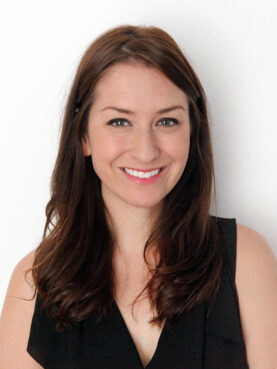
Rebecca Davis. Courtesy photo
Rebecca Davis: Bob’s data is quick to correct a lot of assumptions that social media and the internet has caused a decline in community. The decline started decades before the internet existed. We didn’t spend much time in the documentary on community and the internet, but we want our audience to take away that it’s not just good or bad. It’s a tool. You can use it to do good organizing or bad organizing.
Looking back, what about Putnam’s teaching stood out?
Pete Davis: One of my favorite aspects of the class back in 2010 was that we matter. He would say, I’m giving you all this information, but I want you to go help America. He wanted us to have the spirit of “Ask what you can do for your country.”
RELATED: Rise of the ‘nothing in particulars’ may be sign of a disjointed, disaffected and lonely future
